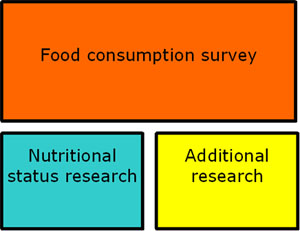Data of the food consumption surveys contribute to policy development on healthy food, food safety, product information and nutrition research. The food consumption survey is a monitoring system with three modules.
Objective
For effective health and food safety policy, data are required on food consumption and nutritional status of the Dutch population as well as specific groups within the population.
Food consumption data give insight into the consumption of foods, intake of macro- and micro-nutrients, and of potential harmful chemical substances, and the development of food and nutrition trends. This insight is essential in formulating and evaluating food policy. The data are also used for public information purposes and for scientific research.
Detailed information on this site is limited to the food consumption surveys conducted from 2003 onwards. Information from previous surveys is presented briefly and further information can be found in various publications.
The survey method used for DNFCS conducted in 1987/88, 1992 and 1997/98 is different from that used for surveys from 2003 onwards.
Thus, results before and after 2003 are not directly comparable.
Methods
The Dutch monitoring system consitst of three modules.
Food consumption survey in the general population
The food consumption survey is designed for continuously collection of basic data on the general Dutch population.
The food consumption survey method comprises two 24-hour dietary recalls on two non-consecutive days. For the youngest and olders age groups this method is combined with diaries. General information is obtained from a written questionnaire which participants are asked to complete. The 24-hour dietary recalls are obtained with purpose-designed computer software. Children untill 15 years of age are interviewed at home together with a parent/carer. Adults are interviewed by phone. Elderly 70 years and older are interviewed at home.
In 2003, a study was performed among young adults (DNFCS-Young adults) as a pilot study for this method among the general population. In 2007-2010 the method is applied in a study among the general population with an age of 7-69 years (DNFCS-Core Survey). From 2012-2016 onwards the food consumption is measured of the total population 1-79 years.
Nutritional status survey
When the above food consumption survey indicate problems or issues in nutrition (e.g. inadequate or excessive intake of certain vitamins or minerals), a follow-up study may be undertaken, for example, on the nutritional status (if possible).
In addition, nutritional status surveys are performed to get insight in the intake of certain micronutrients for which food consumption surveys are not the best method to estimate intake (e.g. sodium and iodine). For the infrastructure of nutritional status surveys there will be cooperated with other studies.
In 2006 and 2010 a study has been done to estimate the intake of sodium and iodine of Dutch adults, in collaboration with the Doetinchem Cohort Study. In specific subgroups of the Dutch population, the intake of vitamins and minerals was determined through measurements in blood: for children of 4 and 8 years old (in collaboration with the PIAMA-cohort study) and for Surinamese and Dutch adults (in collaboration with the SUNSET-study). In addition, for future nutritional status research blood samples are available for adults (in collaboration with NL-de Maat study) and elderly (in collaboration with the LASA study).
Additional research
Additional food consumption surveys can be needed for specific topics or populations. Untill today additional research has been focussed on specific risk groups among the general population, such as children and pregnant women (specific nutrional requirement and/ or habits). In a directed food consumption survey, the recruitment and or method can be adapted to fit the specific needs of the subgroups.
In 2005-2006, a survey of young children between 2 and 6 years old was conducted (DNFCS-Young children) and from 2010-2012 a study among older adults (70+) (DNFCS-Older adults). As part of the HELIUS-study dietary habits of Moroccan, Turkish, Surinamese and native Dutch in Amsterdam was measured from 2010-2015. This was a collaboration project between the AMC-UvA, GGD Amsterdam, RIVM and WUR.
